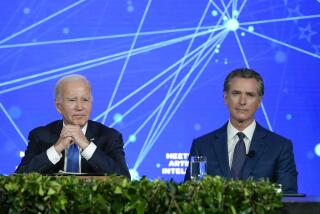Weak Secrecy Is No Secrecy
- Share via
As James Bond movies used to suggest, the government that won the spy war would also triumph in the Cold War. While this was, of course, a bit of Hollywood hyperbole, there’s no question that Americans’ ability to amass secret intelligence has been invaluable, most notably during World War II, when Joseph L. Rochefort and fellow military cryptographers cracked the Japanese code, enabling the U.S. fleet to win the Battle of Midway.
In today’s world, however, where competition is more often economic than military, some laws designed during America’s hot and cold wars have come to hinder rather than help America’s national interests.
That’s why a coalition of leading high-technology industry officials urged Congress last week to pass Senate Bill 1726, which aims to ease government restrictions on U.S. businesses wishing to export cryptographic technology, including codes that Washington cannot decipher at will.
Congress should heed their advice, for increasingly laws limiting the sophistication of encryption technology exports have left America’s high-tech companies losing out to countries like Japan whose governments impose no such restrictions.
The cryptography industry might sound like a backwater of American commerce, but, as a recent national study warned, if the government leaves current laws unchanged, some $60 billion and 200,000 American jobs might be lost over the next four years to foreign competitors in the field. Encryption technology is now avidly being sought by international corporations, banks and securities firms. With it, for example, a pharmaceutical company might keep a new miracle drug secret from competitors until a patent was in place.
Some Clinton administration officials have expressed concern that if the federal government allows the export of encryption technology it cannot easily decipher, it will be unable to access commercial and individual communications for law enforcement purposes. But in their testimony to Congress last week, industry officials explained that because companies usually keep coding keys, U.S. law enforcement authorities would be able to obtain them with a court warrant. Similar assurances have come from national security experts.
Senate Bill 1726 gives our high-tech industries a good shot at regaining the competitiveness that has been lost to antiquated laws. If it does not pass, U.S. businesses will be left in the sorry position of telling their customers nothing was available except the weak encryption products approved for export.
And that, warned Hewlett-Packard vice president Richard W. Sevcik, “would be like telling them to put all their money and valuables in a safe that any amateur burglar could crack open.”






